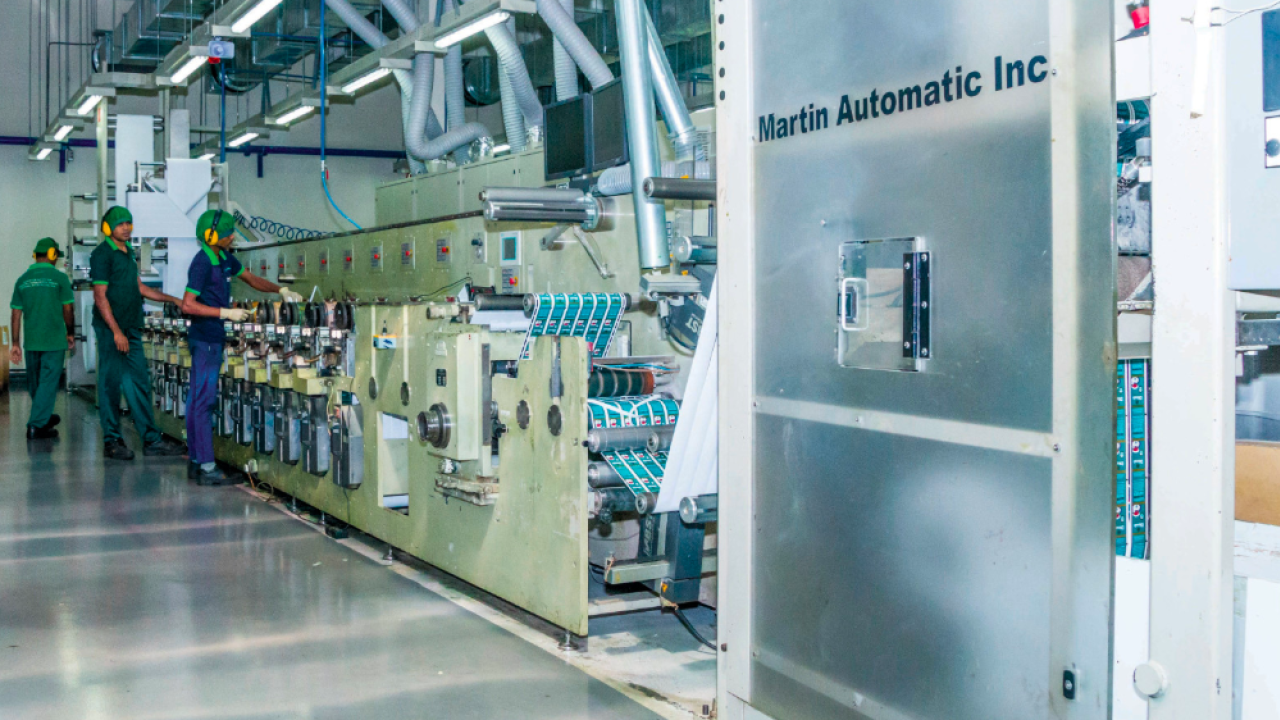Sri Lankan printer continues growth trajectory

The factory houses eight Gidue and Bobst presses – the latest bought in 2017 – and two Martin Automatic MBS unwind/splicer systems and six LRD rewinders, alongside a highly automated ink kitchen by DIC, inspection systems, DuPont Cyrel Fast 1000 TD flexographic plate making system, anilox rollers from Kocher+Beck, and an array of other ancillary equipment.
Sathis Abeywickrama, managing director at Flexiprint, says, ‘We house the highest number of Bobst and Martin Automatic machines in all of Asia. With the company growing at 10 percent annually, we invest in a new press almost every year. We are now in the process of evaluating our next investment.
‘The Martin Automatic machines have reduced our wastage by more than 20 percent and enable our flexo presses to reach full potential without unnecessary stops and changeover times.’
The company has invested in improving efficiency at its plant at every level. From using automated machines required for its operations to high quality equipment, advanced ink mixing technology that uses basic colors to blend and make any desired shade in required quantity with just a click of a button while also indicating ink inventory. ‘This eliminates any chance of human error. Thus, it saves time and wastage, which makes us more efficient,’ says Abeywickrama.
Tea business
Flexiprint, an ISO 22000:2005 certified company, is primarily a manufacturer of tea tags and envelopes. It began its tea bag tag printing business in 1993 with an 8-color Propheteer press and was the first printer in Sri Lanka to use water-based inks at that time. Abeywickrama gradually added five more Propheteer presses to his artillery and invested in the first Bobst machine in 2005 after its visit to Labelexpo Europe.
‘Early on, I knew the tea business was going to grow but that minimum order quantities were going to get smaller,’ says Abeywickrama. ‘Therefore, I always said that tea tags shouldn’t be printed on a gravure machine, and invested in narrow web flexo presses.’
Flexiprint claims to service 63 percent of the Sri Lankan market for tea tags and bags, and is the largest supplier to Dubai for these products. It also exports to India, Eastern Europe, the Middle East, Africa, Maldives, Papua New Guinea, Vietnam, Australia and New Zealand. It converts some 800 tons of paper and board every quarter.
Flexiprint diversified from manufacturing traditional tea bags to pyramid tea bags in early 2007. However, initially the supply of tagged pyramid mesh for manufacturing pyramid tea bags was a Japanese monopoly, and Flexiprint was not authorized to supply it to its customers. The company therefore ventured to Korea and invested in a machine to manufacture tagged pyramid mesh. Today, it services 60 percent of tagged pyramid mesh in Sri Lanka.
Over time, the company has diversified its business to cater to other industries including garments, liquor, pharmaceutical, food and beverage, and lubricants, among others. It now also prints pressure-sensitive labels, barcode labels and blank labels and is venturing into RFID labels to for the garment and food industries.
Abeywickrama also runs an offset plant, under the name PrintUSA, which manufactures cartons for packing tea bags, tea envelopes and loose tea to customers in Kenya, Rwanda, Iran and Sri Lankan. PrintUSA also manufactures offset-printed cartons to service the value-added rubber industry for pharmaceutical and industrial gloves and all kinds of tags and offset printed packaging to the apparel industry.
‘It is not very tough to make a business successful,’ says Abeywickrama. ‘However, staying at the top and constantly innovating is sometimes challenging because there is limited room. That’s why not many companies remain successful for a long time. I, however, am ready to climb even further.’
Stay up to date
Subscribe to the free Label News newsletter and receive the latest content every week. We'll never share your email address.

